Smart Money is Still Leaving Stock Market as Retail Money is Coming Back
Stock-Markets / Financial Markets 2011 Jan 29, 2011 - 12:17 PM GMT U.S. Consumer Sentiment Falls Less Than Forecast - (Bloomberg) Confidence among U.S. consumers fell less than expected in January, a signal the biggest part of the economy may extend gains from late 2010. The Thomson Reuters/University of Michigan final index of consumer sentiment decreased to 74.2 from 74.5 in December. The median forecast in a Bloomberg News survey called for a reading of 73.3, up from a preliminary figure of 72.7 issued earlier this month.
U.S. Consumer Sentiment Falls Less Than Forecast - (Bloomberg) Confidence among U.S. consumers fell less than expected in January, a signal the biggest part of the economy may extend gains from late 2010. The Thomson Reuters/University of Michigan final index of consumer sentiment decreased to 74.2 from 74.5 in December. The median forecast in a Bloomberg News survey called for a reading of 73.3, up from a preliminary figure of 72.7 issued earlier this month.
U.K. Consumer Confidence Plunges Most Since 1994 as `Painful Period' Looms
(Bloomberg) U.K. consumer confidence plunged the most since 1994 this month as an increase in sales tax hurt shoppers’ appetite for spending, a report by GfK NOP Ltd. showed.
The index of sentiment fell 8 points from December to minus 29, the lowest since March 2009, the research group said in a statement in London today. All five measures of the index fell, with a gauge on the climate for making major purchases dropping 22 points to minus 29.
January's eight point drop represents an astonishing collapse in consumer confidence," said Nick Moon, managing director of GfK NOP Social Research. "In the 35 years since the index began, confidence has only slumped this much on six occasions, the last being in the midst of the 1992 recession."
Smart money is still leaving, retail money is coming back.
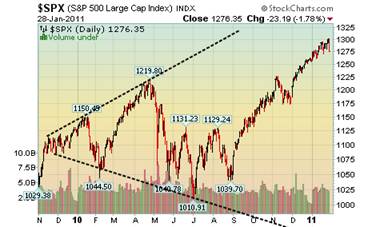 -- In the week ending January 21, the S&P 500 saw 2 insider buys (Tiffany and Fastenal for a total of $131,227) and 60 insider sales, worth $373 million, for a total insider sell-to-buy ratio of 2,842x. Insiders are very concerned. In the week ended January 19, domestic equity funds as reported by ICI saw an inflow of $2,971 million following last week's inflow of $4,229 million. Why are retail investors buying at the top?
-- In the week ending January 21, the S&P 500 saw 2 insider buys (Tiffany and Fastenal for a total of $131,227) and 60 insider sales, worth $373 million, for a total insider sell-to-buy ratio of 2,842x. Insiders are very concerned. In the week ended January 19, domestic equity funds as reported by ICI saw an inflow of $2,971 million following last week's inflow of $4,229 million. Why are retail investors buying at the top?
Middle East Rioting Drives Safe-Haven investors to Bonds.
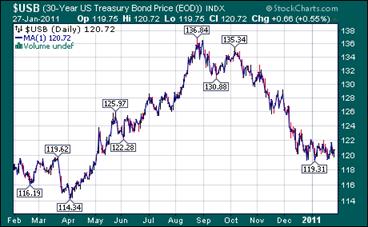 --Treasuries rose amid concern protests in Egypt are intensifying, sending investors to the relative safety of U.S. government debt.
--Treasuries rose amid concern protests in Egypt are intensifying, sending investors to the relative safety of U.S. government debt.
U.S. bonds earlier fell, pushing 30-year yields to a nine- month high, as Commerce Department data showed the U.S. economy accelerated in the fourth quarter, driven by the biggest gain in consumer spending in more than four years and rising exports. U.S. stocks dropped after reversing gains.
Gold Fell Below October-November Lows.
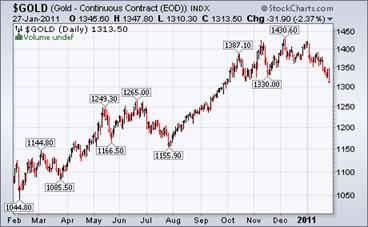 --Gold futures jumped the most in 12 weeks on demand for a haven amid escalating tensions in Egypt.
--Gold futures jumped the most in 12 weeks on demand for a haven amid escalating tensions in Egypt.
The media is always trying to link the price of gold to world events. Yes, despots are being overthrown and escaping with their gold stash, but this has been going on for weeks as the price of gold has declined. Technically, the gold uptrend is now broken, but there will be a temporary attempt to regain the old trend.
Japan’s Stocks Not Able to Regain the High Ground.
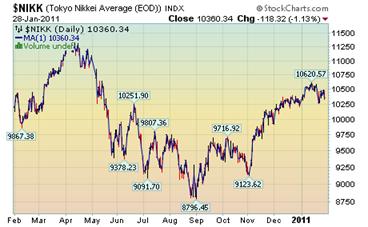 --Japanese stocks declined after the nation’s credit rating was cut for the first time in nine years by Standard & Poor’s, as persistent deflation and political gridlock undermine efforts to reduce the nation’s debt burden. The Nikkei 225 Stock Average fell 1.1 percent to 10,360.34 as of the close in Tokyo. The Topix lost 1.1 percent to 919.69, with more than 5 times as many shares declining as gaining. Both gauges today dropped the most in a week. For the week, the Nikkei 225 gained 0.8 percent, while the Topix rose 1 percent.
--Japanese stocks declined after the nation’s credit rating was cut for the first time in nine years by Standard & Poor’s, as persistent deflation and political gridlock undermine efforts to reduce the nation’s debt burden. The Nikkei 225 Stock Average fell 1.1 percent to 10,360.34 as of the close in Tokyo. The Topix lost 1.1 percent to 919.69, with more than 5 times as many shares declining as gaining. Both gauges today dropped the most in a week. For the week, the Nikkei 225 gained 0.8 percent, while the Topix rose 1 percent.
China Stocks Rebounded.
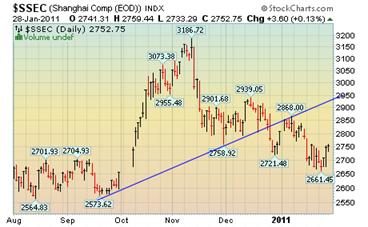 -- China’s stocks rose, capping the benchmark index’s biggest five-day gain in six weeks, as automakers and industrial companies rallied on speculation their shares are undervalued given earnings growth prospects. The Shanghai Composite Index, which tracks the bigger of China’s stock exchanges, added 3.6, or 0.1 percent, to 2,752.75 at the 3 p.m. close. It gained 1.4 percent this week, the most since the five days ended Dec. 17. China’s markets will be closed from Feb. 2 to 8 for the lunar new year holiday.
-- China’s stocks rose, capping the benchmark index’s biggest five-day gain in six weeks, as automakers and industrial companies rallied on speculation their shares are undervalued given earnings growth prospects. The Shanghai Composite Index, which tracks the bigger of China’s stock exchanges, added 3.6, or 0.1 percent, to 2,752.75 at the 3 p.m. close. It gained 1.4 percent this week, the most since the five days ended Dec. 17. China’s markets will be closed from Feb. 2 to 8 for the lunar new year holiday.
The Dollar May be Ready for a Comeback.
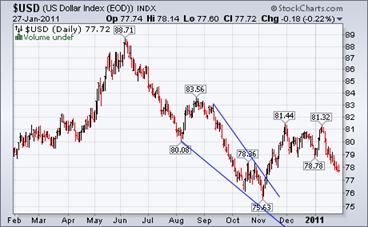 -- The dollar traded near a two-week high against the yen before U.S. reports that may show economic growth accelerated and consumer spending rose, adding to signs the world’s largest economy is building momentum. The greenback rose for a second day versus the pound after a U.K. report showed consumer confidence plummeted the most in almost two decades this month, backing the case for the Bank of England to keep interest rates low.
-- The dollar traded near a two-week high against the yen before U.S. reports that may show economic growth accelerated and consumer spending rose, adding to signs the world’s largest economy is building momentum. The greenback rose for a second day versus the pound after a U.K. report showed consumer confidence plummeted the most in almost two decades this month, backing the case for the Bank of England to keep interest rates low.
Churches Find End Is Nigh?
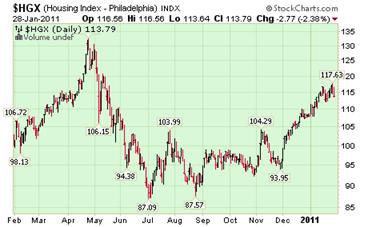 -- Residential and commercial real-estate owners aren't the only ones losing their properties to foreclosure. The past few years have seen a rapid acceleration in the number of churches losing their sanctuaries because they can't pay the mortgage. Just as homeowners borrowed too much or built too big during boom times, many churches did the same and now are struggling as their congregations shrink and collections fall owing to rising unemployment and a weak economy.
-- Residential and commercial real-estate owners aren't the only ones losing their properties to foreclosure. The past few years have seen a rapid acceleration in the number of churches losing their sanctuaries because they can't pay the mortgage. Just as homeowners borrowed too much or built too big during boom times, many churches did the same and now are struggling as their congregations shrink and collections fall owing to rising unemployment and a weak economy.
Gasoline Prices soon to Decline at the Pump.
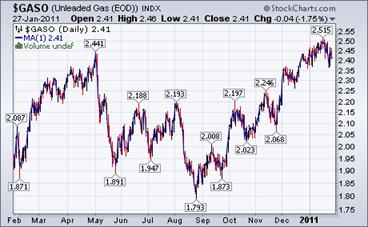 --The Energy Information Agency weekly report states, “The U.S. average retail price for a gallon of gasoline increased for the eighth straight week, advancing six-tenths of a cent versus last week to $3.11 per gallon, $0.41 per gallon higher than last year at this time.”
--The Energy Information Agency weekly report states, “The U.S. average retail price for a gallon of gasoline increased for the eighth straight week, advancing six-tenths of a cent versus last week to $3.11 per gallon, $0.41 per gallon higher than last year at this time.”
The chart shows “wholesale prices, while EIA is reporting on retail. The prices at the pump should start dropping very soon.
Natural Gas are Becoming More Volatile.
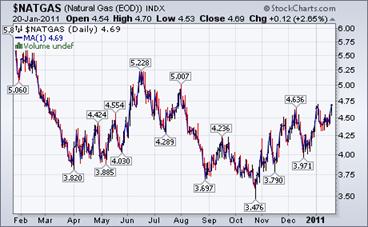 -- The U.S. Energy Information Administration reports, “Prices generally softened over the past week but showed considerable daily volatility in the Northeast, as capacity bottlenecks arose. One local distribution company in the area experienced near-record customer demand on Sunday and Monday which taxed distribution capacity.”
-- The U.S. Energy Information Administration reports, “Prices generally softened over the past week but showed considerable daily volatility in the Northeast, as capacity bottlenecks arose. One local distribution company in the area experienced near-record customer demand on Sunday and Monday which taxed distribution capacity.”
Goldman Sachs Got Billions From AIG For Its Own Account, Crisis Panel Finds
(HuffingtonPost) Goldman Sachs collected $2.9 billion from the American International Group as payout on a speculative trade it placed for the benefit of its own account, receiving the bulk of those funds after AIG received an enormous taxpayer rescue, according to the final report of an investigative panel appointed by Congress.
The fact that a significant slice of the proceeds secured by Goldman through the AIG bailout landed in its own account--as opposed to those of its clients or business partners-- has not been previously disclosed. These details about the workings of the controversial AIG bailout, which eventually swelled to $182 billion, are among the more eye-catching revelations in the report to be released Thursday by the bipartisan Financial Crisis Inquiry Commission.
Judge temporarily delays loan document shredding
(Reuters) - A U.S. bankruptcy judge temporarily blocked bankrupt subprime lender Mortgage Lenders Network USA from destroying 18,000 boxes of original loan files after federal prosecutors said documents in them may be needed as evidence in more than 50 criminal investigations.
In a hearing Monday before U.S. Bankruptcy Judge Peter J. Walsh, a representative from the Delaware U.S. Attorneys' Office said she did not know details of any of the investigations.
But she said prosecutors and FBI offices around the country had requested time to access to the boxes and assess whether the contents contain needed evidence before the judge permits any destruction. Walsh granted a 30-day delay, and said he would hold another hearing on Mortgage Lenders' request.
Blood on Bernanke's Hands; Riots in Egypt over Food Prices and Unemployment; Protests Spread to Algeria, Morocco and Yemen; Twitter in the Spotlight
(Mish) Violence in Egypt continues unabated in spite of President Hosni Mubarak's plea for calm. Demonstrators threw firebombs and chanted "Down with Hosni Mubarak, down with the tyrant." Police responded with teargas and bullets.
Protesters are angry over poverty, rising food prices, state food subsidies, unemployment, and social conditions.
Social media outlets, especially Twitter have played a leading role in organizing protests. The Obama administration and the US state department have also resorted to Twitter and Facebook.
Quant Wipeout In Process?
(ZeroHedge) Morgan Stanley Sees Recent Market Conditions As Reminiscent Of August 2007 Quant Crash, As "Don't Fight The Fed" Groupthink Trade Fizzles
Something scary this way comes from Morgan Stanley's Quantiative and Derivative Strategies: "market conditions over the last two weeks are somewhat reminiscent of that during the August 2007 ‘Quant Crisis’. In only a few days, a number of quantitative long-short equity funds experienced unprecedented losses in seemingly ‘normal’ market conditions. We do not suggest here that the magnitude of hypothetical losses match those from 2007, however, there is little question that the rotation has drawn attention of many quant investors." In other words, the massive groupthink trade that we have been warning about for months may be about to claim its first mass casualties.
Meet The Man Behind The Liquidating Hedge Fund That Blew Up The Gold Market
(ZeroHedge) Over the past several weeks there had been rumors that the reason for the precipitous drop in gold was primarily driven by a hedge fund liquidating its futures positions. This has now been confirmed: "Yeah, that was just me liquidating my spread position," Mr. Daniel Shak, [of SHK Asset Management] 51 years old, said in an interview. "I had a significant, fully margined position. The dollar amount of the gold liquidation was very small, it was just a lot of contracts." Of course in the extremely jittery gold market, the kind of persistent marginal gross selling of contracts was all that was needed to spook weak hands into a consistent dump of the precious metal, which as we pointed out was beyond overdone.
Traders alert: The Practical Investor is currently offering the daily Inner Circle Newsletter to new subscribers. Contact us at tpi@thepracticalinvestor.com for a free sample newsletter and subscription information.
Our Investment Advisor Registration is on the Web
We are in the process of updating our website at www.thepracticalinvestor.com to have more information on our services. Log on and click on Advisor Registration to get more details.
If you are a client or wish to become one, please make an appointment to discuss our investment strategies by calling Connie or Tony at (517) 699-1554, ext 10 or 11. Or e-mail us at tpi@thepracticalinvestor.com .
Anthony M. Cherniawski, President and CIO http://www.thepracticalinvestor.com
As a State Registered Investment Advisor, The Practical Investor (TPI) manages private client investment portfolios using a proprietary investment strategy created by Chief Investment Officer Tony Cherniawski. Throughout 2000-01, when many investors felt the pain of double digit market losses, TPI successfully navigated the choppy investment waters, creating a profit for our private investment clients. With a focus on preserving assets and capitalizing on opportunities, TPI clients benefited greatly from the TPI strategies, allowing them to stay on track with their life goals
Disclaimer: The content in this article is written for educational and informational purposes only. There is no offer or recommendation to buy or sell any security and no information contained here should be interpreted or construed as investment advice. Do you own due diligence as the information in this article is the opinion of Anthony M. Cherniawski and subject to change without notice.
Anthony M. Cherniawski Archive |
© 2005-2022 http://www.MarketOracle.co.uk - The Market Oracle is a FREE Daily Financial Markets Analysis & Forecasting online publication.



